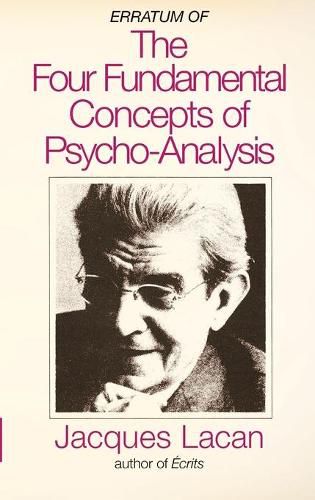Readings Newsletter
Become a Readings Member to make your shopping experience even easier.
Sign in or sign up for free!
You’re not far away from qualifying for FREE standard shipping within Australia
You’ve qualified for FREE standard shipping within Australia
The cart is loading…






This title is printed to order. This book may have been self-published. If so, we cannot guarantee the quality of the content. In the main most books will have gone through the editing process however some may not. We therefore suggest that you be aware of this before ordering this book. If in doubt check either the author or publisher’s details as we are unable to accept any returns unless they are faulty. Please contact us if you have any questions.
Dr. Lacan’s writings, and especially the seminars for which he has become famous, have provoked intense controversies in French analytic circles, requiring as they do a radical reappraisal of the legacy bequeathed by Freud. The Four Fundamental Concepts of Psycho-Analysis is based on a year’s seminar, which is of particular importance because he was addressing a larger, less specialized audience than ever before, among whom he could not assume familiarity with his work. For his listeners then, and for his readers now, he wanted to introduce a certain coherence into the major concepts on which psycho-analysis is based, namely, the unconscious, repetition, the transference, and the drive. This particular seminar, in this particular edition, has often been used as the basic text for Anglo-American scholars and students alike seduced by the possibilities inherent in Lacanian psycho-analysis. In particular, notions of the gaze and ruminations on the role of subjectivity in two-dimensional representations have been adopted wholesale by spheres of film studies, art history, and visual studies. By default, Alan Sheridan, through this translation, has been key in the reception of Lacan in the Anglo-American academy. Alas, particularly for visual studies, a key phrase in this edition differs significantly from the French edition. An internet search proves that both versions of this phrase have been quoted equally in North American scholarly writings. While arguments could be made as to the apt-ness of continuing to use Sheridan’s translation as it exists - and we at Parasitic Ventures Press considered the possibility of presenting one such - we offer, instead, this edition, an Erratum of The Four Fundamental Concepts of Psycho-Analysis, to allow our readers to decide for themselves.
$9.00 standard shipping within Australia
FREE standard shipping within Australia for orders over $100.00
Express & International shipping calculated at checkout
This title is printed to order. This book may have been self-published. If so, we cannot guarantee the quality of the content. In the main most books will have gone through the editing process however some may not. We therefore suggest that you be aware of this before ordering this book. If in doubt check either the author or publisher’s details as we are unable to accept any returns unless they are faulty. Please contact us if you have any questions.
Dr. Lacan’s writings, and especially the seminars for which he has become famous, have provoked intense controversies in French analytic circles, requiring as they do a radical reappraisal of the legacy bequeathed by Freud. The Four Fundamental Concepts of Psycho-Analysis is based on a year’s seminar, which is of particular importance because he was addressing a larger, less specialized audience than ever before, among whom he could not assume familiarity with his work. For his listeners then, and for his readers now, he wanted to introduce a certain coherence into the major concepts on which psycho-analysis is based, namely, the unconscious, repetition, the transference, and the drive. This particular seminar, in this particular edition, has often been used as the basic text for Anglo-American scholars and students alike seduced by the possibilities inherent in Lacanian psycho-analysis. In particular, notions of the gaze and ruminations on the role of subjectivity in two-dimensional representations have been adopted wholesale by spheres of film studies, art history, and visual studies. By default, Alan Sheridan, through this translation, has been key in the reception of Lacan in the Anglo-American academy. Alas, particularly for visual studies, a key phrase in this edition differs significantly from the French edition. An internet search proves that both versions of this phrase have been quoted equally in North American scholarly writings. While arguments could be made as to the apt-ness of continuing to use Sheridan’s translation as it exists - and we at Parasitic Ventures Press considered the possibility of presenting one such - we offer, instead, this edition, an Erratum of The Four Fundamental Concepts of Psycho-Analysis, to allow our readers to decide for themselves.